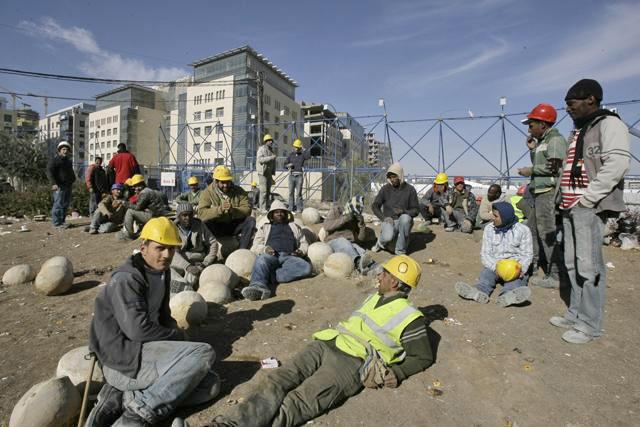You are here
‘Majority of workers in Jordan are not paid enough to afford a decent life’
By Ana V. Ibáñez Prieto - Oct 07,2018 - Last updated at Oct 07,2018

Restrictions on workers' freedom of association were the main issue facing the correct application of decent work standards, according to a paper issued on the occasion of World Day for Decent Work on Sunday (File photo)
AMMAN — Working conditions in the Kingdom remain "far from the decent work standards" and continue to deteriorate in several economic sectors, according to a position paper issued on Sunday by the Phenix Centre for Economic and Informatics Studies in cooperation with the German Friedrich Ebert Foundation.
The paper was issued on the occasion of World Day for Decent Work, held annually by the International Trade Union Confederation on October 7, with the aim of mobilising trade unions across the globe to promote decent work standards.
According to the definition by the International Labour Organisation (ILO), decent work "sums up the aspirations of people in their working lives", involving opportunities for productive work positions that deliver "a fair income, security in the workplace and social protection for families, better prospects for personal development and social integration, freedom for people to express their concerns, organise and participate in the decisions that affect their lives and equality of opportunity and treatment for all women and men".
During the UN General Assembly in September 2015, the four pillars of ILO'S Decent Work Agenda — employment creation, social protection, rights at work, and social dialogue — became integral elements of the 2030 Agenda for Sustainable Development, with Goal 8 of the Agenda calling for "the promotion of sustained, inclusive and sustainable economic growth, full and productive employment and decent work".
"But, although Jordan was the first Arab country to sign an agreement with the ILO in 2006 to implement a national programme for the achievement of decent work, working conditions in the Kingdom are still weak, and even worsening in many economic sectors," the position paper warned.
On job creation, it indicated that Jordan has witnessed a "significant" decline in the number of jobs available, highlighting that less than 50,000 jobs were created during 2016 and no statistics were available for the year of 2017, while the unemployment rate stood at 18.7 per cent during the second quarter of 2018.
They attributed the decline in the number of job opportunities to the tax burden and the increase in the cost of production and the social security deductions, in addition to "structural imbalances in the labour market and the existing gap between the needs of labour marked and the higher education outputs".
Low wage levels were also highlighted, alongside the high cost of living and the consequent increase in poverty rates, warning that "the majority of workers in Jordan are not paid enough to afford a decent life".
According to the official figures issued by the Social Security Corporation for 2017, 47 per cent of the workers in the formal economy did not earn more than JD400 per month, while only 7.3 per cent received monthly wages of more than JD1,000.
Restrictions on the workers' freedom of association were the main issue facing the correct application of decent work standards, according to the paper, which charged that "the government still refuses to make the legislative amendments needed to end the ban on the establishment of new trade unions outside the official framework, which currently represents as little as a 5 per cent of the total labour force".
In July this year, the regional desk officer for the Arab Region at the ILO Nezam Qahoush stated that there is a “large file of complaints” against the Jordanian government concerning workers’ freedom of association, expressing the UN agency’s “great concern” over the obstacles faced by workers based in the Kingdom when attempting to assemble.
“While the working conditions in Jordan are fairly better than in many other countries across the Arab region, Jordanian workers are suffering from a lack of response to complaints related to freedom of association and trade union activity,” Qahoush said, noting the agency’s attempts to communicate with Jordanian officials in order to tackle the issue.
“Freedom of association is a basic right and not a luxury,” Phenix Centre Director Ahmad Awad told The Jordan Times, stressing the need to “enable workers to participate actively and genuinely in the protection of their interests, the development of fair labour policies and the social dialogue process”.
“The absence of effective trade union organisations is the cause of the imbalances in society and the labour market, leading to the widespread labour violations among Jordanians and immigrants alike,” Awad added.
The paper also warned that the "weakness" of the law enforcement system has led to "widespread violations of the rights of workers".
The organisations called on the government and its various organs to "take into consideration the challenges faced by workers when implementing labour policies”, demanding more focus on issues such as job creation, tax regulations, social dialogue between employers and workers, wage policies, trade unions and the inclusion of all workers in the social protection system.
The Ministry of Labour was not able to comment on the paper, despite several attempts by The Jordan Times.
Related Articles
AMMAN — The Phenix Centre for Economic and Informatics Studies released on Saturday a report on decent work in Jordan in partnership with th
AMMAN — Regional Desk Officer for the Arab Region at the International Labour Organisation (ILO) Nezam Qahoush has recently stated that ther
AMMAN — The coronavirus crisis has deepened the issues related to decent work in Jordan through its negative impact on different components















